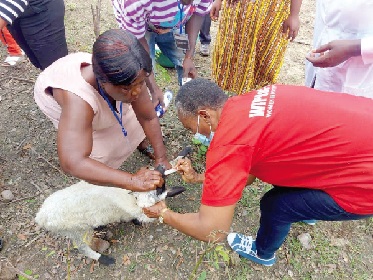
Livestock rearing: GAPNET equips community personnel with animal healthcare skills
Many people venture into livestock ranging without due care for the medical aspect to ensure the continued wellbeing of the animals.
Aside from a few commonly known medications for common diseases that livestock farmers administer as and when necessary, much of the health of their stocks are left to chance.
Advertisement
Many a time, too, the farmers and breeders lack access to affordable preventive animal health care services.
The situation is markedly different from advanced countries where specialist care is sought and deployed at pens and ranches at all times.
To help correct the anomaly, a non-governmental organisation (NGO), Ghana Poultry Network (GAPNET) has partnered with Veterinarians without Borders Canada to organise series of training in the country on animal health, mainly for animal health workers, to improve their capacity.
The intervention is to enable them to offer enhanced and expanse array of services to the benefit of smallholder animal farmers targeted at vulnerable groups.
The training combines both theory and practicals to provide the trainees with hands-on skills towards the detection and treatment of zoonotic and neglected livestock diseases.
Suhum benefits
With funding from Global Affairs Canada, GAPNET has just completed a 10-day training for animal health workers in the Suhum municipality in the Eastern Region.
The training aimed at helping the 15 community animal health workers from seven selected communities from in and around Eastern Region to improve on their knowledge in animal health and to bridge the gap between community animal health workers and veterinaries.
It is part of a larger project GAPNET and its partners are implementing in countries including Kenya, Senegal, Loas, Vietnam and Cambodia.
Since 2020, GAPNET has trained 42 personnel as community animal health workers: 28 in the north (Sirigu),14 in the south(Suhum) 30 in the Bolgatanga in the Upper East Region and 15 in Suhum. It has plans to train 48 more by January next year.
In December this year, the 30 personnel in Bolgatanga will receive a refresher training to enable them to obtain a licence certificate from the Regional Veterinary Directorate.
“The overall objective of this project is to improve the economic and social well-being of the poorest, most marginalied people, particularly women and girls in the six countries in Africa and Asia, through support to animal, human and environmental health initiatives,” the Project Coordinator for GAPNET, Gloria Essel told the Daily Graphic.
The trainees will work closely with the Veterinary Service Directorate of the Ministry of Food and Agriculture (MoFA) as well as the Ghana Health Service, the Environmental Health Division of the metropolitan, municipal and district assemblies (MMDAs) and other stakeholders involved in human and animal health within the One Health Approach.
Hard to reach terrains
A Facilitator and Volunteer with the Veterinarians Without Boarders Dr Ebenezer Ghamli, said the training seeks to train people selected from hard-to-reach and at-risk communities in good animal husbandry practices and basic animal health care.
“The Community Animal Health Workers model focuses on creating awareness the prevention and control of zoonotic diseases and other neglected tropical diseases whose prevalence constitutes a major disease among agro-pastoral communities, hence the urgency in training these selected people,” he stated.
Dr Ghamli explained that the trainees were taken to the field to study and learn more about the changes and attributes of some local breeds of poultry and small ruminants when they are healthy and sick.
That was to aid them to help the livestock keepers in their various communities to take care of their livestock.
Reforms
A volunteer with the Veterinarians Without Boarders, Dr Geoffrey Akabua, also told the Daily Graphic that the training programme would go a long way to supplement the reforms introduced in 1992 by the government to support livestock keepers.
“In 1992, the government of Ghana as part of the public sector reforms introduced the concept of primary animal health care and production to support livestock and that is one of the basic motives behind this training,” he stated.
Dr Akabua added that the reform involved training farmer representatives of traditional actors in basic livestock management principles and animal health with production support from MoFA.
Tehnology
A Eastern Regional Director of Veterinary, Dr Emmanuel Adetor, welcomed the inclusion of “Telehealth” in animal health care.
He encouraged the trainees to be dedicated to their services after the training and pledged that the veterinary officers were ready to work hand in hand with them to give primary health care to all livestock.
“We are happy this training isn’t only theoretical but practical as well, because apart from the seminars, the trainees will be thought how to use technological devices to provide primary health care to livestock keepers in the absence of veterinary officers in their communities,” he said.
Dr Adetor stressed how crucial and important the training was for the regional veterinary officers because with their support, it would help expand veterinary services to reach all those who needed it.
MOFA support.
The Municipal Director of Agriculture, Suhum, Samuel Kofi Dzisah, gave the assurance that the trainees and the veterinary officers would be accorded the continuous support of the agriculture ministry and urged them to look beyond the challenges in the discharge of their duties.
“MOFA provides technical veterinary services to livestock keepers in communities through their para-vets. The challenge, however, is that most of these veterinary officers are under resourced and inadequate to support all livestock keepers in their communities but the ministry will support them in our own little ways,” he stated.
GAPNET and its partners present certificates to the trainees, smartphones and start-up kits that will enable them to start their work in the various communities.



